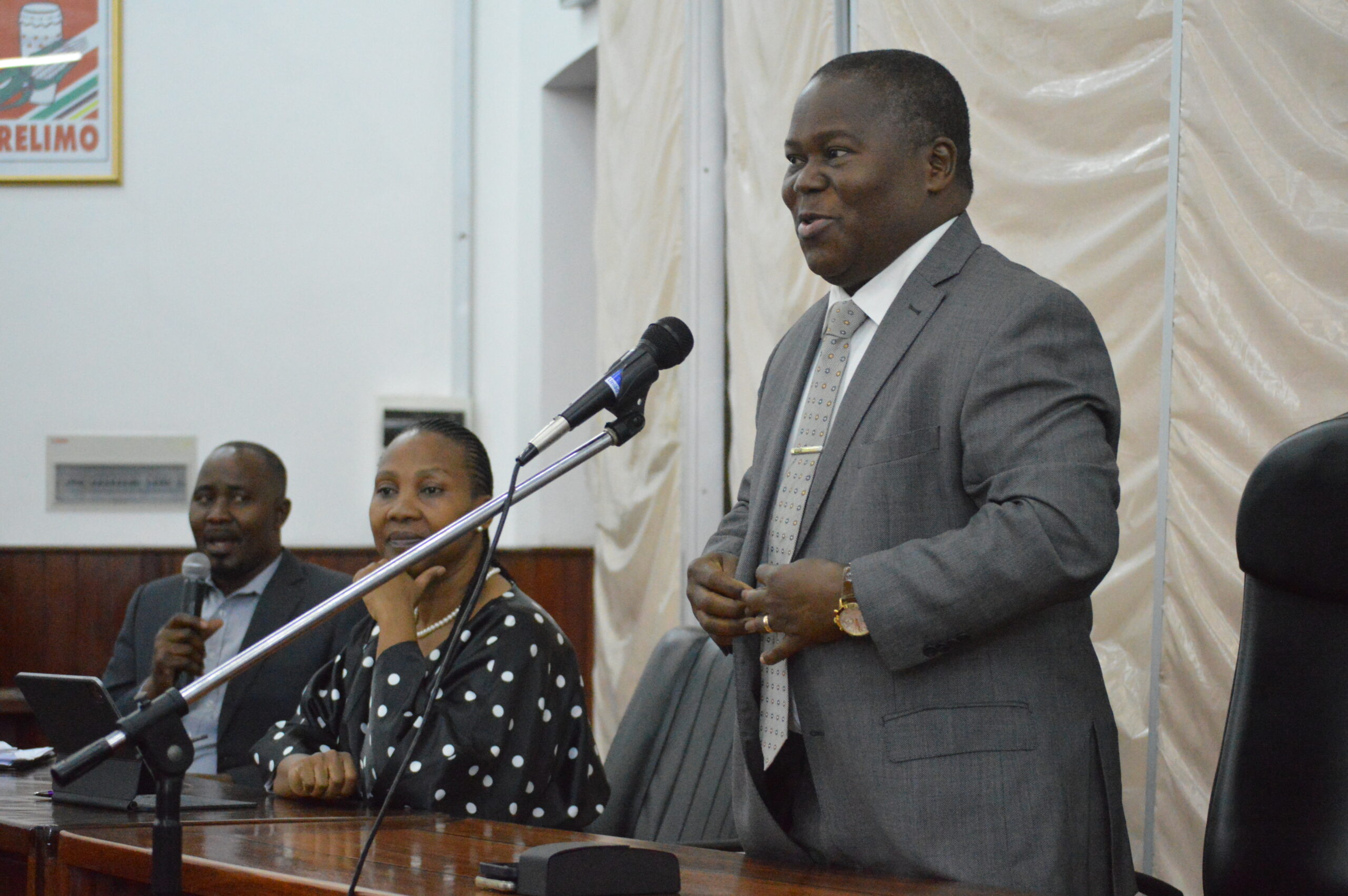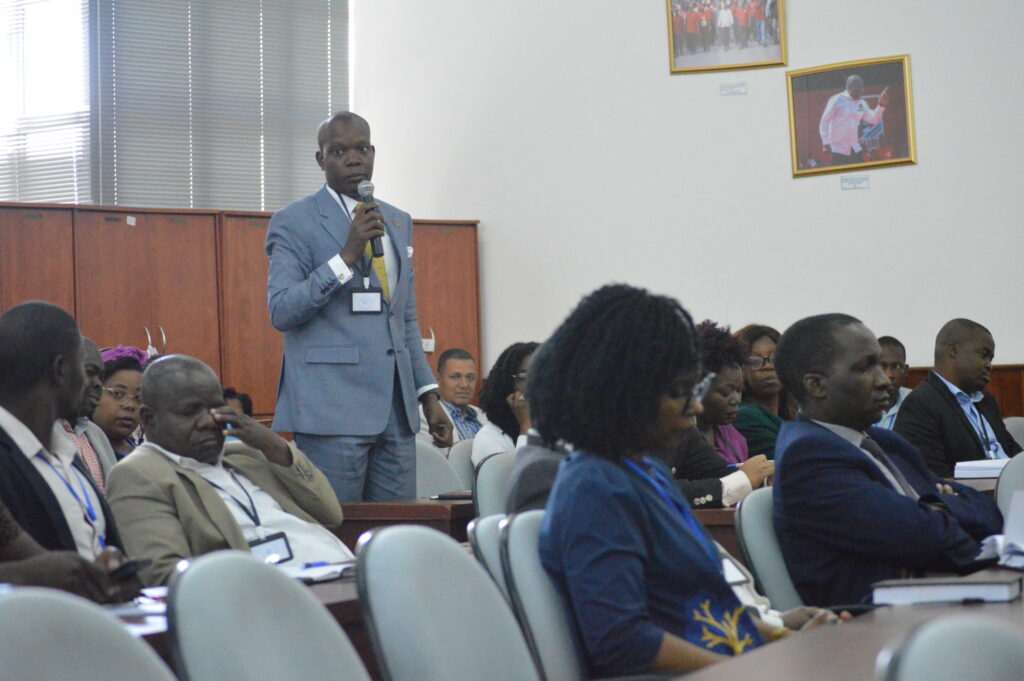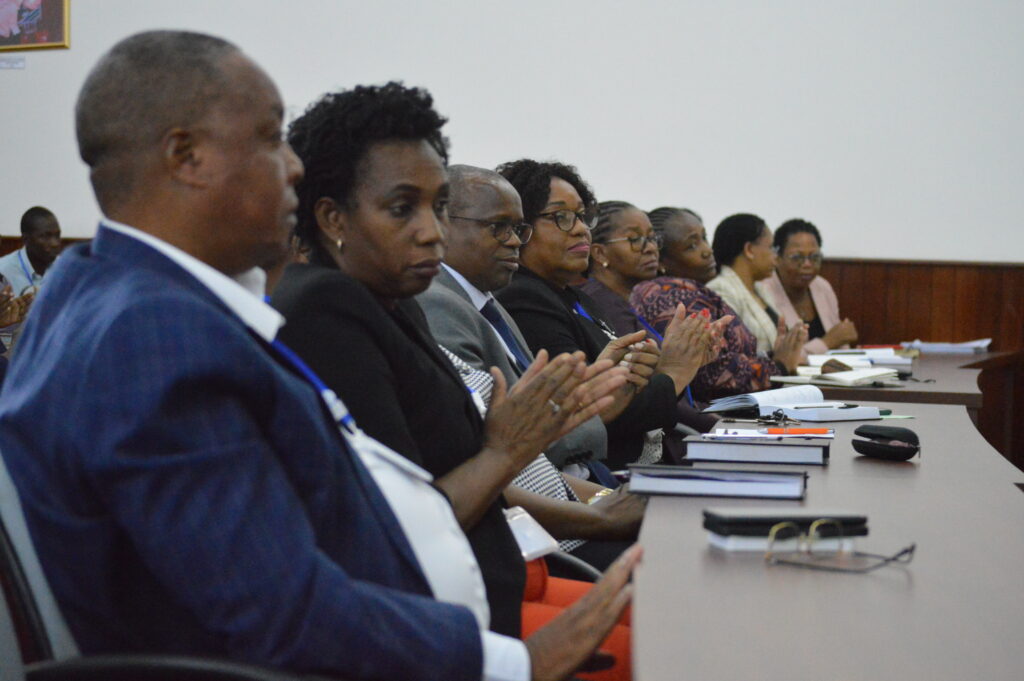
READY: The Secretary General/ Clerk of the National Assembly of Mozambique, Mr. Alfredo Vasco Noguiera Nampete (right), addresses staff members of his parliament in Maputo on a renewed SIDA-funded Sexual Reproductive Health Rights, HIV and AIDS Governance Project while SADC PF SG Ms Boemo Sekgoma (second from left) listens in. Photo: Moses Magadza
Moses Magadza in Mozambique
MAPUTO – The Secretary General/ Clerk of the National Assembly of Mozambique, Mr. Alfredo Vasco Noguiera Nampete, has rallied staff of his parliament behind a renewed Sexual Reproductive Health Rights, HIV and AIDS Governance Project.
The SADC Parliamentary Forum is implementing the three-year Project that is open to 15 national parliaments in the SADC region. The Swedish International Development Agency (SIDA), which financially supported the first and second phases of the Project, is funding the third phase to the tune of USD 5 million.

On Wednesday Nampete and SADC PF Secretary General Ms. Boemo Sekgoma signed an Implementation Agreement on behalf of their institutions, signaling the resumption of the Project in Mozambique, which participated in the second phase.
A theory of change that foresees a cascading impact, beginning with building the capacity of Members of Parliament as representatives of the people and spreading to societal change through comprehensive SRHR initiatives, legislative reforms, and media involvement, undergirds the Project.
Mr Nampete contends that for all staff of the parliament of Mozambique to fully support Parliament and Members of Parliament in implementing the Project, they must not only fully appreciate its objectives but clearly define their roles in it.

To that end, he facilitated a meeting with all staff of the National Assembly of Mozambique and Sekgoma, who was accompanied by Mrs. Yapoka Nyirenda Mungandi, the Director of Finance & Corporate Services at SADC PF.
Mr Nampete noted that although the National Assembly of Mozambique was represented at the SADC PF by its Speaker and five Members of Parliament, the majority of staff of parliament did not know much about it. Few knew much about the SRHR, HIV and AIDS Governance Project.
To fill this knowledge gap, Mrs Mungandi explained that the SADC PF was the legislative arm of SADC. Bringing together 15 national parliaments and about 3700 parliamentarians from different political formations to ensure diversity, the Forum was working towards transforming into a SADC Regional Parliament.
The staff heard that the Plenary is the supreme decision-making body of the SADC PF which meets twice a year. It is officially opened by the head of state of the host country and is headed by a president selected from among Speakers of Member Parliaments who serves for two years on rotation.
It was explained that the Forum works through five Standing Committee while the Executive Committee – which includes a member of the Regional Women’s Parliamentary Caucus (RWPC) – serves as the management board of the Forum. A Committee of Clerks serves as an advisory body to the SADC PF Secretariat which the Republic of Namibia hosts.
In terms of sustainability, it was clarified that member parliaments make mandatory annual contributions with more support rendered by cooperating partners. The Forum also gets in-kind support – mostly expertise – from various sources that include SADC and the United Nations family.
On the SRHR, HIV and AIDS Governance Project, Mrs Mungandi said SIDA, which has supported the Forum for over 10 years, was supporting it. Implementing parliaments would be supported on national activities and would benefit, also, from regional activities.
Ms Sekgoma commended Mr Nampete for facilitating the meeting with staff of parliament. She described the staff as the “backbone of the institution of parliament, drivers of accountability and the link between parliament the citizens”.
She urged them to collaborate with the Forum and the National Assembly of Mozambique to ensure full institutionalisation of the Project. The SADC PF SG presented the salient issues of the SADC PF’s new Strategic Plan and its three main pillars that include capacity building, the development of normative standards including model laws and sound fiscal governance.
Ms. Sekgoma challenged the staff to familiarise themselves with SADC organs and their roles.
The SRHR, HIV and AIDS Governance Project has inspired remarkable enthusiasm in Mozambique, with staff of parliament now keen to know more about it and play meaningful roles in its implementation.

General elections are due to be held in Mozambique later this year. The meeting between SADC PF and staff of the National Assembly of Mozambique was thus meant to ensure that when the new parliament is constituted after the elections, the staff can support the MPs more intelligently.









